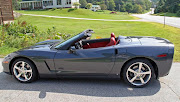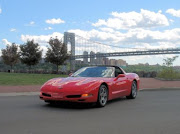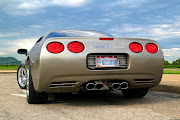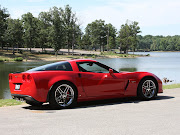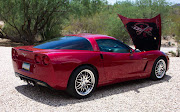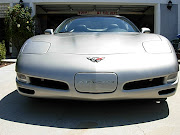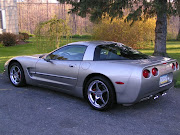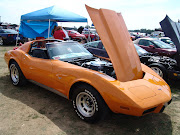 I'm inspired by this photo to talk a little about how this whole Corvette phenomenon began. So let's hop again into the Way Back Machine and take a trip back to 1951.
I'm inspired by this photo to talk a little about how this whole Corvette phenomenon began. So let's hop again into the Way Back Machine and take a trip back to 1951.While there were many involved in its design and production, Zora Arkus-Duntov is generally considered to be the "Father" of the Corvette. But designing and building a classic vehicle that has stood the test of time for over 50 years takes more than one man. At that time Harley Earl’s “Special Projects” crew began work on this new sports car for General Motors. As the concept work began, Bob McLean designed a general layout for the car which was originally code named, "Project Opel."
Chevrolet’s chief photographer at the time, Myron Scott, is credited for coming up with the name that has become legendary in the automotive world — Corvette — drawing from the small, fast warships of the "Corvette" class.
The logo for the new car was supposedly determined by the wallpaper design on a hotel room in Paris in 1908. The story goes that William Durant, the founder of GM, ripped off a small piece of this wallpaper and brought the scrap back to Detroit. It apparently had designs on it that resembled a bow tie.
 For its introductory year, the Corvette was produced in a temporary GM facility in Flint, Michigan. This 1st generation Corvette (C1) was available only in Polo White with a red vinyl interior, black soft top and red wheels. Although Corvette was not the first car to be made with a fiberglass body, it was the first car — and the last — to have a wrap-around windshield.
For its introductory year, the Corvette was produced in a temporary GM facility in Flint, Michigan. This 1st generation Corvette (C1) was available only in Polo White with a red vinyl interior, black soft top and red wheels. Although Corvette was not the first car to be made with a fiberglass body, it was the first car — and the last — to have a wrap-around windshield. Corvette's fiberglass body was comprised of 46 pieces glued together to form the nine major subassemblies.
A 150 hp Blue Flame Six engine powered it, and it was backed up by a Powerglide transmission. At only 150 hp, the performance was less than startling, but with a total production run of only 300 units, the 1953 is still the rarest of all model year Corvettes. And although only 300 were produced, there are approximately 225 still existing today.
A 150 hp Blue Flame Six engine powered it, and it was backed up by a Powerglide transmission. At only 150 hp, the performance was less than startling, but with a total production run of only 300 units, the 1953 is still the rarest of all model year Corvettes. And although only 300 were produced, there are approximately 225 still existing today.
 At the Autorama show circuit the new Corvette featured crossed American and checkered flags on the front emblem and horn button. When it was later discovered that using an American flag on a product trademark was illegal, the emblem was changed shortly before the Corvette made its debut in January, 1953, at the Motorama in New York.
At the Autorama show circuit the new Corvette featured crossed American and checkered flags on the front emblem and horn button. When it was later discovered that using an American flag on a product trademark was illegal, the emblem was changed shortly before the Corvette made its debut in January, 1953, at the Motorama in New York.Less than six months later, on Tuesday, June 30, 1953, Corvette #1 Serial Number E53F001001 rolled off the assembly line in Flint, Michigan, and Corvette production began. The first two Corvettes, VIN Numbers 1 and 2 were said to have been destroyed, but no records prove that fact, and there are no witnesses to the destruction. You may want to quit reading now and go check the Serial Number of the one in your garage. It might be one of them.
The following year production was moved to the plant in St. Louis. Every Corvette from model year 1954 through model year 1981 was produced in the St. Louis facility.
If you would like additional information the 1953 Corvette, here's a great website with more info than you can imagine: http://auto.howstuffworks.com/1953-corvette1.htm
If you found this article interesting, please leave a comment by clicking on the word "comment" at the bottom of this post. You may as well find it now and get used to clicking it because you're going to be clicking it a lot when we start having the Corvette Giveaways. Also, if there is anything inaccurate in here, please let me know so I can correct it.
Look for the word "comment" below. It should be right under the right front tire of that 1953 Corvette you see there. See it? Well click it, and you can add anything you'd like.
This is a repost of a previous story from back in January.













